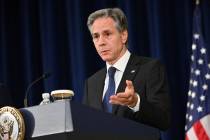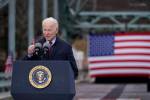Senate starts health care reform fight
WASHINGTON -- Riven by partisanship, the Senate plunged into a widely anticipated debate Monday over sweeping health care legislation that President Barack Obama and congressional Democrats have vowed to approve and Republicans have sworn to block.
Debate is expected to last for weeks over the legislation, which includes a first-time requirement for most Americans to carry insurance and for insurers to cover any paying customer regardless of medical history or condition.
"We must avoid the temptation to drown in distractions and distortions," Senate Majority Leader Harry Reid said in the first moments of the first speech, a jab at Republicans that was reciprocated minutes later.
"Well, I don't know what's more preposterous: saying that this plan 'saves Medicare' or thinking that people will actually believe you," Sen. Mitch McConnell of Kentucky said of Reid's oft-made statement.
Despite its huge price tag, the Congressional Budget Office has estimated the 2,074-page bill would reduce federal deficits by $130 billion over the next decade. In all, CBO said 31 million uninsured individuals would receive insurance if the bill were enacted, many of them assisted by federal subsidies. As much as 94 percent of the eligible population would wind up covered. The legislation would be paid for through a combination of cuts in projected Medicare payments to hospitals and other providers, a payroll tax on the wealthy and taxes on drug makers, medical device manufacturers, owners of high-cost insurance and others.
It has taken months to advance. The Democrats control 60 seats in the Senate, precisely the number needed to trump a promised Republican filibuster. While Reid spent most of the day jousting with Republicans, his ability to steer the bill to passage will depend on finding ways to finesse controversial provisions within the measure. None is more important than calls for the government to sell insurance in competition with private firms. Liberals favor the plan; moderate and conservative Democrats oppose it.
Even before Reid rose to speak, the two parties were squabbling over a new Congressional Budget Office study assessing the legislation's impact on the cost of insurance.
The report said that by 2016, premium prices for Americans working at large companies, about 134 million people, would be between zero and 3 percent lower on average than would otherwise be the case.
At small companies, estimated to provide coverage for 25 million by 2016, the average premium would be between 1 percent higher to 2 percent lower on average. That did not factor in the federal subsidies that would be available to the firms to spur them to provide coverage. Those receiving the assistance would have premiums as much as 11 percent lower on average.
CBO said for non-group coverage, premiums would rise by between 10 percent and 13 percent on average. But more than half that group is expected to receive federal subsidies that would result in premiums as much as 59 percent less costly on average. Individuals purchasing coverage without any federal assistance would presumably face higher costs, although CBO's letter did not indicate how much more.




























